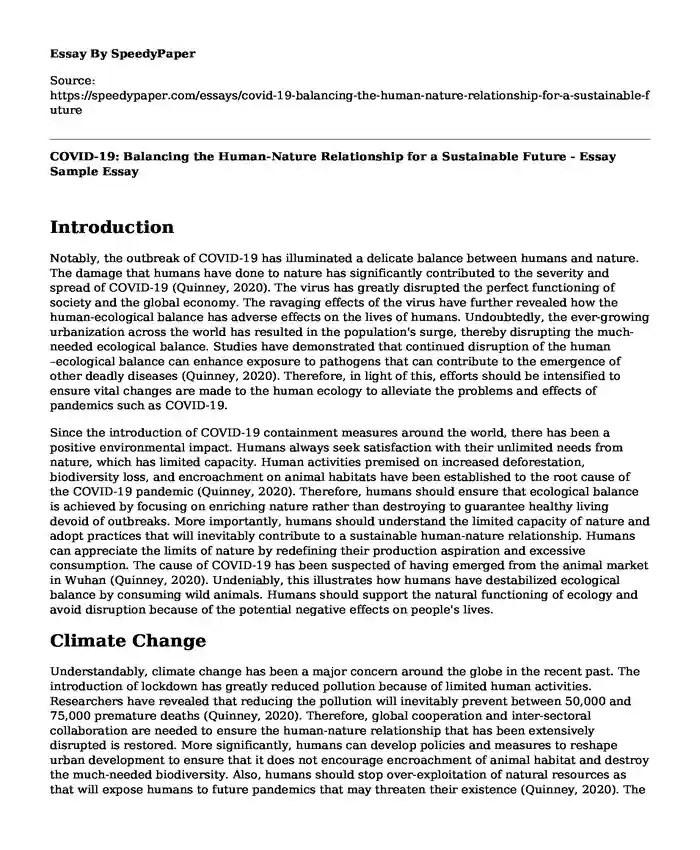
| Type of paper: | Essay |
| Categories: | Covid 19 Climate change |
| Pages: | 3 |
| Wordcount: | 641 words |
Introduction
Notably, the outbreak of COVID-19 has illuminated a delicate balance between humans and nature. The damage that humans have done to nature has significantly contributed to the severity and spread of COVID-19 (Quinney, 2020). The virus has greatly disrupted the perfect functioning of society and the global economy. The ravaging effects of the virus have further revealed how the human-ecological balance has adverse effects on the lives of humans. Undoubtedly, the ever-growing urbanization across the world has resulted in the population's surge, thereby disrupting the much-needed ecological balance. Studies have demonstrated that continued disruption of the human –ecological balance can enhance exposure to pathogens that can contribute to the emergence of other deadly diseases (Quinney, 2020). Therefore, in light of this, efforts should be intensified to ensure vital changes are made to the human ecology to alleviate the problems and effects of pandemics such as COVID-19.
Since the introduction of COVID-19 containment measures around the world, there has been a positive environmental impact. Humans always seek satisfaction with their unlimited needs from nature, which has limited capacity. Human activities premised on increased deforestation, biodiversity loss, and encroachment on animal habitats have been established to the root cause of the COVID-19 pandemic (Quinney, 2020). Therefore, humans should ensure that ecological balance is achieved by focusing on enriching nature rather than destroying to guarantee healthy living devoid of outbreaks. More importantly, humans should understand the limited capacity of nature and adopt practices that will inevitably contribute to a sustainable human-nature relationship. Humans can appreciate the limits of nature by redefining their production aspiration and excessive consumption. The cause of COVID-19 has been suspected of having emerged from the animal market in Wuhan (Quinney, 2020). Undeniably, this illustrates how humans have destabilized ecological balance by consuming wild animals. Humans should support the natural functioning of ecology and avoid disruption because of the potential negative effects on people's lives.
Climate Change
Understandably, climate change has been a major concern around the globe in the recent past. The introduction of lockdown has greatly reduced pollution because of limited human activities. Researchers have revealed that reducing the pollution will inevitably prevent between 50,000 and 75,000 premature deaths (Quinney, 2020). Therefore, global cooperation and inter-sectoral collaboration are needed to ensure the human-nature relationship that has been extensively disrupted is restored. More significantly, humans can develop policies and measures to reshape urban development to ensure that it does not encourage encroachment of animal habitat and destroy the much-needed biodiversity. Also, humans should stop over-exploitation of natural resources as that will expose humans to future pandemics that may threaten their existence (Quinney, 2020). The COVID-19 virus could have been avoided if humans could adopt effective habitat management and embrace restoration efforts. Moreover, humans should understand the underlying connections between the natural environment and humanity to help create a sustainable relationship that promotes healthy living.
It should be noted that the alleviation of problems caused by COVID-19 can be achieved when humans generate a turning point where nature and humanity are brought into sustainable balance. Additionally, humans should initiate proper responses to environmental problems and develop intervening policies that will inevitably curtail the similar occurrence of pandemics such as COVID-19. Equally important, a deeper understanding of the human-nature relationships can be enhanced by invoking an interdisciplinary approach. Nature plays an instrumental role in the lives of humans. Modern society is heavily characterized by increased population and industrial growth that threatens the capacity to guarantee human survival (Quinney, 2020). Shifting focus on promoting better human connectedness to nature is crucial in restoring the ecological balance that will enrich the health of the people. More fundamentally, reflecting on modern transformations will illuminate the need for enhancing sustainable human-nature relationships to guarantee a healthy society.
Reference
Quinney, M. (2020). COVID-19 and nature are linked. So should be the recovery. World Economic Forum https://www.weforum.org/agenda/2020/04/covid-19-nature-deforestation-recovery/
Cite this page
COVID-19: Balancing the Human-Nature Relationship for a Sustainable Future - Essay Sample. (2023, Aug 28). Retrieved from https://speedypaper.com/essays/covid-19-balancing-the-human-nature-relationship-for-a-sustainable-future
Request Removal
If you are the original author of this essay and no longer wish to have it published on the SpeedyPaper website, please click below to request its removal:
- Effects of Stimulants Described in Our Free Essay
- Free Paper on Androgenetic Alopecia Treatment
- Essay sample: Type 2 Diabetes Primary Prevention
- Free Essay on Environmental Studies (A Case of Silicon Valley)
- Civil Disorder During Corona Virus Pandemic - Free Essay
- Interventions for Depression Amongst Australian Prison Inmates. Essay Example
- Free Paper Sample: Depression and Anxiety in Relation to Sports Psychology
Popular categories




